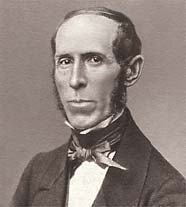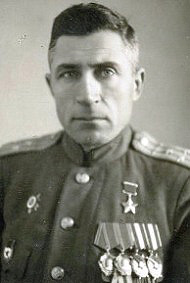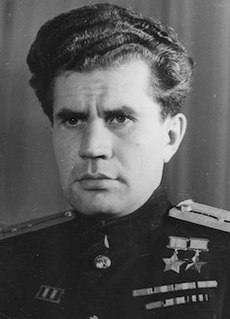 W
WVasily Ivanovich Agapkin was a Russian and Soviet military orchestra conductor, composer, and author of the well-known march "Farewell of Slavianka".
 W
WAlexander Vasilyevich Alexandrov was a Soviet and Russian composer and founder of the Alexandrov Ensemble, who wrote the music for the State Anthem of the Soviet Union, which in 2000 became the national anthem of Russia. During his career, he also worked as a professor of the Moscow Conservatory, and became a Doctor of Arts. His work was recognized by the awards of the title of People's Artist of the USSR and two Stalin Prizes.
 W
WAbram Efimovich Arkhipov was a Russian realist artist, who was a member of the art collective The Wanderers as well as the Union of Russian Artists.
 W
WSergey Semyonovich Biryuzov was a Marshal of the Soviet Union and Chief of the General Staff.
 W
WNikolay Ivanovich Bogolyubov was a Soviet actor born in Ivanovskoye, Russia and a People's Artist of the RSFSR (1945). In 1933 he played in Boris Barnet's Okraina; in 1941, he was awarded the Stalin Prize.
 W
WAnna Petrovna Bunina was a Russian poet. She was the first female Russian writer to make a living solely from literary work. She is a relative of Nobel Prize winner Ivan Bunin.
 W
WAlexey Dmitrievich Galakhov was a Russian author and literary historian, best known for his Russian Reader for Children (1842), and The History of Russian Literature, Old and New (1863–1875). Galakhov, the Professor at the Saint Petersburg History and Philology Institute, contributed regularly to numerous high profile magazines, most notably, Andrey Krayevsky's Otechestvennye Zapiski where from 1839 till 1856 he published more than 900 articles and reviews, occasionally under the pseudonym Sto Odin. He was the author of several novelettes and books of memoirs.
 W
WErast Pavlovich Garin was a Soviet and Russian actor, director and screenwriter. He was, together with Igor Ilyinsky and Sergey Martinson, one of the leading comic actors of Vsevolod Meyerhold's company and of the Soviet cinema. He was named People's Artist of the USSR in 1977.
 W
WSergei Ivanovich Gusev was a Russian revolutionary, a founding member of the Bolshevik faction of the Russian Social Democratic Labour Party (RSDLP), and Soviet party leader.
 W
WAleksandra Nikolayevna Susokolova, better known as Aleksandra Jacobi, was Russian journalist, memoirist and publicist, translator and publisher who also used the pseudonym Toliverova and signed her work as Peshkova-Toliverova. Her portraits have been painted by her common-law husband Valery Jacobi, as well as Vasily Vereshchagin.
 W
WIvan Ivanovich Kabitsin was a Soviet Army colonel and Hero of the Soviet Union.
 W
WNadezhda Dmitryevna Khvoshchinskaya, was a Russian novelist, poet, literary critic and translator. Her married name was Zayonchkovskaya. She published much of her work under the pseudonym V. Krestovsky. She later added "alias" to her pseudonym to avoid being confused with the writer Vsevolod Krestovsky.
 W
WViktor Nikolayevich Leonov was a Soviet Navy officer and twice Hero of the Soviet Union. Considered a legend in the Soviet era after the war, he frequently gave speeches to Communist organizations about the war, but he became obscure after the fall of the Soviet Union.
 W
WKirill Afanasievich Meretskov was a Soviet military commander. Having joined the Communist Party in 1917, he served in the Red Army from 1920. During the Winter War of 1939-1940 against Finland, he had the task of penetrating the Mannerheim Line as commander of the 7th Army. He was awarded the title of Hero of the Soviet Union shortly afterwards.
 W
WIvan Vladimirovich Michurin was a Russian practitioner of selection to produce new types of crop plants, Honorable Member of the Soviet Academy of Sciences, and academician of the Lenin All-Union Academy of Agriculture.
 W
WNikolai Ivanovich Nadezhdin was a Russian literary critic and Russia's first ethnographer.
 W
WKlavdiya Andreevna Nechaeva was a Soviet fighter pilot during World War II who was killed in action protecting her squadron commander during the battle of Stalingrad.
 W
WBoris Kuzmich Novikov was a Soviet actor of theater and cinema. People's Artist of Russia (1994).
 W
WPyotr Alekseevich Kobozev was a prominent Russian revolutionary, statesman and a professor. He had played a significant role in establishing and maintaining Soviet regime in the Ural region, Turkestan and the Far East.
 W
WSergei Dmitryevich Sazonov GCB was a Russian statesman and diplomat who served as Foreign Minister from November 1910 to July 1916. The degree of his involvement in the events leading up to the outbreak of World War I is a matter of keen debate, with some historians putting the blame for an early and provocative mobilization squarely on Sazonov's shoulders, and others maintaining that his chief preoccupation was "to reduce the temperature of international relations, especially in the Balkans".
 W
WMakar Fomich Teryokhin was a Soviet Army lieutenant general and a Hero of the Soviet Union.
 W
WVladimir Pavlovich Titov, better known under the pseudonym Tit Kosmokratov, was a Russian writer, statesman, diplomat. As a writer he is best known for the novella The Remote House on Vasilyevsky Island, which was influenced by the writings of Aleksandr Pushkin.
 W
WKonstantin Eduardovich Tsiolkovsky (Russian: Константин Эдуардович Циолковский17 September [O.S. 5 September] 1857
 W
WNikolay Ivanovich Vasilyev was a Red Army colonel killed in World War II.
 W
WIgor Petrovich Veselkin was a Russian Soviet realist painter, graphic artist, scenographer, stage designer, and art teacher, professor of the Repin Institute of Arts, who lived and worked in Saint Petersburg. He was a member of the Saint Petersburg Union of Artists, and regarded as one of the representatives of the Leningrad school of painting.
 W
WAleksei Alekseyevich Volkov was a Russian Soviet statesman and first secretary of the Byelorussian SSR during the Soviet Union.
 W
WSergei Alexandrovich Yesenin was a Russian lyric poet. He is one of the most popular and well-known Russian poets of the 20th century.